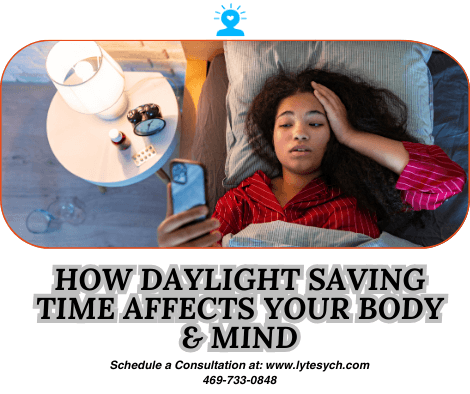Sat Mar 08 2025
How Daylight Saving Time Affects Your Body and Mind at Lyte Psychiatry (Affordable Therapist and Psychiatrist Near You), Best Adults and Adolescents Therapist and Psychiatrist Near You, Dallas, TX

How Daylight Saving Time Affects Your Body and Mind at Lyte Psychiatry (Affordable Therapist and Psychiatrist Near You)
When the clocks shift, do you find yourself out of sorts—more tired in the morning, restless at night, or unexpectedly moody? You’re not alone. Daylight Saving Time (DST) can throw off your internal rhythm, leaving your body and mind struggling to adapt. Below, we explore why this happens and how Lyte Psychiatry in Dallas, TX, can help you reclaim restful sleep and balanced mental health.
Why Does Daylight Saving Time Matter?
Our bodies follow a natural cycle known as the circadian rhythm. It relies heavily on light signals to know when it’s time to sleep, wake up, or even eat. Changing the clock by an hour, whether it’s spring forward or fall back, can disrupt this delicate balance. The result? You may experience grogginess, mood swings, and even heightened stress levels.
The Impact of Daylight Saving on Your Body
Energy Fluctuations
The of Daylight Saving Impact on Your Mind
Difficulty Concentrating
Schedule a Initial Consultation at Lyte Psychiatry (Affordable Therapist and Psychiatrist Near You) Dallas, TX.
If you’re struggling to cope with the effects of Daylight Saving Time—whether it’s trouble sleeping, mood changes, or elevated stress—it’s time to reach out. Contact Lyte Psychiatry today to schedule an evaluation and explore affordable, tailored options for both adults and adolescents in the Dallas area. Our compassionate team is here to help you regain a sense of balance.
To see our services. Click Here
To Schedule an Appointment. Click Here
Call us if you have question at 469-733-0848
Frequently Asked Questions
Q: How long does it usually take to adjust to Daylight Saving Time?
A: Most people adapt within a week or two, but some may need more time, especially if they already struggle with sleep or mental health concerns.
Q: Does going to bed earlier or later before the time change really help?
A: Yes. Gradually shifting your sleep schedule by 10–15 minutes for a few days before the clock change can ease your body into the new routine.
Q: Can Daylight Saving Time cause depression?
A: While DST itself may not cause depression, sudden changes in daylight and disrupted sleep can exacerbate existing conditions like seasonal affective disorder or major depressive disorder.
Q: Should my teenager follow the same tips to adjust?
A: Absolutely. Adolescents can be more sensitive to changes in routine. Encouraging consistent bedtimes, limiting screen time, and seeking professional help if needed can all make a difference.
Q: What can I do if I still can’t sleep properly after DST?
A: Consider reaching out to a mental health professional. At Lyte Psychiatry, we offer personalized strategies—like adjusting sleep habits, therapy, or medication management—to address ongoing sleep difficulties.
Q: How do I book an appointment at Lyte Psychiatry?
A: Simply call our office or visit our website. Our friendly staff will help with insurance and scheduling, connecting you to the best professional for your needs.